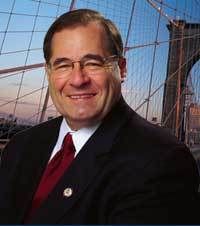 New York State’s Eighth Congressional District is a diverse mosaic covering Manhattan’s West Side below 89th Street, Lower Manhattan, and areas of Brooklyn including Borough Park, Coney Island, Brighton Beach, Sea Gate, Bay Ridge and Bensonhurst. Since 1992, Congressman Jerrold Nadler has ably represented the eighth in the House of Representatives following his sixteen years of service in the New York State Assembly.
New York State’s Eighth Congressional District is a diverse mosaic covering Manhattan’s West Side below 89th Street, Lower Manhattan, and areas of Brooklyn including Borough Park, Coney Island, Brighton Beach, Sea Gate, Bay Ridge and Bensonhurst. Since 1992, Congressman Jerrold Nadler has ably represented the eighth in the House of Representatives following his sixteen years of service in the New York State Assembly.Nadler is a senior member of both the House Judiciary and Transportation committees. In 1998, Nadler gained national prominence as a steadfast defender of President Bill Clinton during the House Judiciary’s impeachment proceedings. Mostly, Nadler’s legislative career in Washington has been focused on championing civil liberties and progressive causes such as universal access to healthcare. His service on the Transportation Committee is especially important for his district as increasing demands challenges New York City’s mass transit system.
9/11 had the greatest impact on Nadler’s district where the World Trade Center used to reside. Yet even as America was consumed by fear and irrationality, Nadler continued to champion civil liberties, peace and prudence in our foreign policy. On Saturday, Nadler joined activists from New York and around the nation, at the National Mall in Washington, DC to protest the Bush administration’s War in Iraq.
Nadler just authored the Protect the Troops and Bring Them Home Act (HR 455), which stipulates no funds can be used in Iraq except to protect the troops and arrange for their withdrawal beginning in one month and ending by December 31, 2007. Nadler’s act also provides that the number of U.S. troops in Iraq cannot be increased at any time. In a press release issued on January 26th, Nadler observed:
“It has been wrongly asserted that Congress cannot force the President to de-escalate or withdraw from Iraq because it cannot use its only real power – cutting off funds - lest it be accused of ‘abandoning the troops.’ But if Congress appropriates funds, but limits those funds to protecting the troops and redeploying them from Iraq, that would be the best way of supporting the troops. In fact, keeping (or adding) American soldiers in the middle of a civil war with no end in sight is the ultimate act of abandonment. We must save American lives by bringing them home as soon as possible.”Nadler was also recently named new Chair of the House Judiciary Committee’s Subcommittee on the Constitution, Civil Rights and Civil Liberties. He noted in a press release issued on January 24th that,
“In 1995, our Republican colleagues, upon assuming control of this committee, changed the name of the ‘Subcommittee on Civil and Constitutional Rights’ to the ‘Subcommittee on the Constitution.’Congressman Nadler graciously agreed to be interviewed by me in a podcast format. Our interview took place just before he left for an event and had to be squeezed in a tight schedule. Among the topics we covered were his proposed legislation to withdraw troops from Iraq, former President Carter's controversial book, Israeli-Palestinian relations and the merits of impeaching President Bush and Vice President Cheney. Please refer to the media player below.
I have long promised that, were I ever in a position to do so, I would put the words ‘civil’ and ‘rights’ back in the name of this subcommittee. Today, the Judiciary Committee does just that.
Now, more than ever, it is vitally important that we give meaning to these words through action. Civil rights and civil liberties are under assault in this nation. We are at a pivotal moment in our history and we have to decide as a nation whether we are willing to fight for the rights enshrined in our Bill of Rights.”
This interview can also be accessed for free via the Itunes Store by searching for "Intrepid Liberal Journal."
1 comment:
Way to get Nads. So he's basically saying that we have to wait for Bush to commit one more impeachable offense before we can seek it.
Post a Comment